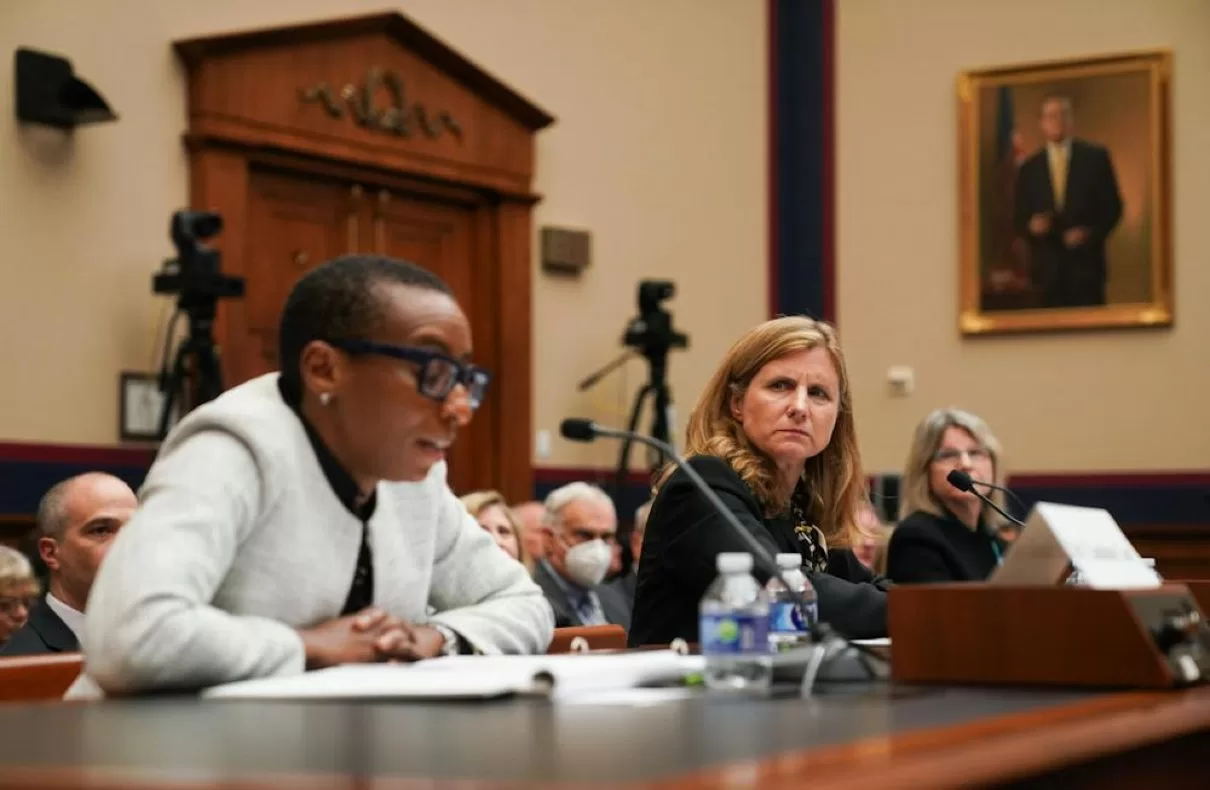On Tuesday, the presidents of Harvard University, the University of Pennsylvania, and the Massachusetts Institute of Technology testified before a House committee.
The hearing focused on how the presidents have handled antisemitic incidents on their campuses since the October 7, 2023 terrorist attack by Hamas on Israel.
The presidents said they have taken steps to combat antisemitism on campus, including:
- Increasing security
- Providing additional counseling and mental health
Many Republican lawmakers questioned the presidents, insisting they aren’t doing enough to root out and denounce anti-Jewish sentiments. The hearing was scheduled for 10:15 AM EST.
“As you confront our questions in this hearing, remember that you are not speaking to us, but to the students on your campus who have been threatened and assaulted and who look to you to protect them,” she said.
As chair of the House Committee on Education and the Workforce, Foxx invited Harvard president Claudine Gay, Penn president Liz Magill and MIT president Sally Kornbluth to testify.
“After the events of the past two months, it is clear that rabid antisemitism and the university are two ideas that cannot be cleaved from one another,” Foxx said.
For several hours, the presidents faced questions about their disciplinary actions toward students regarding acts of antisemitism, how their schools’ hiring practices ensure their faculty represent diverse viewpoints and how they are ensuring safety on campus.
While Republican leaders of the committee said the focus of the hearing was on addressing antisemitism, the college leaders also said they are seeing a rise in Islamophobia and are working to combat those acts of hate as well.
Several Republican members of the committee argued that the college presidents are not doing enough to protect Jewish students on campus.
In a testy exchange, Republican Rep. Elise Stefanik of New York asked Gay if Harvard would take disciplinary action against students or applicants who say “from the river to the sea” or “intifada.”
The two terms are sometimes used at pro-Palestinian protests and Stefanik argued that the use of “intifada” in the context of the Israeli-Arab conflict is “indeed a call for violent armed resistance against the state of Israel, including violence against civilians and the genocide of Jews.”
Gay said that type of “hateful, reckless, offensive speech” is “abhorrent” to her. “Do you believe that type of hateful speech is contrary to Harvard’s code of conduct or is it allowed at Harvard?” Stefanik, a Harvard graduate, pressed.
“It is at odds with the value of Harvard, but … we embrace a commitment to free expression even of views that are objectionable, offensive, hateful,” Gay said.
When that speech crosses into conduct that violates Harvard’s policies against bullying and harassment, or incites violence or threatens safety, then action is taken, she said.
“We have robust disciplinary processes that allow us to hold individuals accountable,” Gay said.
Since the October 7 Hamas terrorist attack on Israel, the Department of Education has opened an unprecedented number of investigations into alleged incidents of hate on college campuses.
Both Harvard and Penn, along with six other colleges and four K-12 school districts, are under investigation.
The investigations were launched under Title VI of the Civil Rights Act, which says universities and K-12 schools have a responsibility to provide all students with an environment free from discrimination.
At the conclusion of the investigations, the Department of Education will make recommendations to the schools. The schools risk losing federal funding if they don’t comply.
The focus of Tuesday’s hearing was about addressing antisemitism specifically, but the three college presidents made clear they are also working to combat all forms of hate, including incidents of Islamophobia – which are also on the rise.
“MIT will take on both, not lumped together, but with equal energy and in parallel,” said Kornbluth, who is Jewish, during her opening remarks.
Some Republican lawmakers argued that too often, incidents of antisemitism are conflated with those of Islamophobia.
“It’s wrong to suggest that antisemitism and Islamophobia are equivalent problems in this country,” said Republican Rep. Bob Good of Virginia.
This past Sunday, a group supporting Gaza and Palestinians marched through Philadelphia, stopping to protest outside an Israeli-style falafel shop – a rally that was condemned by the White House and Pennsylvania governor as “antisemitic.”
The march also approached Penn’s campus and some property was spray painted with graffiti with “messages about the ongoing war as well as general anti-establishment, anti-police messaging,” according to the Penn Division of Public Safety.
Good asked Penn president Magill if there has been any large, equivalent-sized gathering in support of the “slaughter of Muslims or the elimination of an Arab or predominantly Muslim state” on or near campus since October 7.




